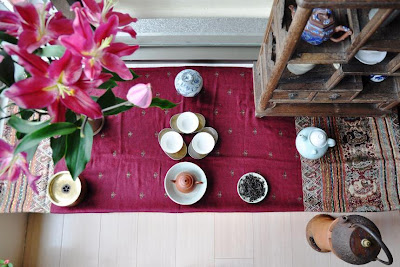An exceptional tea celebrates the New Year and it requires exceptional accessories, a great set up and a slow gongfu brewing. 2 hours are dedicated to drinking just this tea.
I let the leaves rest in a porcelain jar for a while. Then, I pick my smallest zhuni teapot, De Hua dragon cups, copper Cha Tuos with silver rim and a copper Shui Fang (kensui). For Christmas, I always purchase lily flowers to decorate our apartment. Now, they have blossomed and add a festive feeling to my Cha Xi. I could even find a matching scarf and use it as Cha Bu!
On this cold day, I'm glad to start a charcoal fire in the brazier. This Nilu is higher than the one I usually use. The space for the charcoal is deeper, but less wide. But it's just wide enough for the charcoal. The air flow is good and the fire required less efforts on my part to sustain. (All braziers are not created equal...)
Here are the leaves! They are from the Rou Gui cultivar and were harvested this spring, in May, in the official Wu Yi area. (There, leaves are only harvested once a year!)
To evaluate dry Yan Cha, we can proceed with 2 breathings. First, we smell the roasting. Second, we smell to look for fragrances of lichen moss. Yan Cha means rock tea for a reason: the trees grow between rocks and cliffs. Licken moss covers many rocks and their smell permeates real Yan Cha.
With most great teas, I recommend to use fewer leaves and long brewing times. Not for Wu Yi. This tea is best brewed strong. So, I used all the leaves above. They filled more than half of my small teapot. Its zhuni clay doesn't 'mellow' the taste very much, so I'm careful to pour the boiling water very slowly in this teapot. But what this clay and teapot does best is to make a very pure, unaldurated and powerful tea. My first brewing time is around a minute: I want it strong! Here is the first brew:
I'm salivating just looking at this picture again! From the brown look of the tea soup, I should have expected a strong taste. So, except for a slightly dry feeling on the tongue, try to imagine a warm cup of sweet velvet that lightly flows down the throat instead! The charcoal fire has mellowed the spring water to perfection! Then, it hits you. The eyes open up, the spirits lighten and the whole body warms up! Its aftertaste lets your heart pound, as if you had just glimpsed at your sweetheart after a long separation.
Amazing! Let's make more rounds:
The wholeness of the fragrance is also special: the roast fragrances are not separated from the tea. The darker roast notes so well complete the fresh tea fragrances that I don't know where one starts and the other stops.
Later brews turn a little lighter in color, but still produce a very
bright golden orange reflection. It shines in the cup as well as on the
palate. The mouth remains so pure, clean and light! There's even a hint of minty freshness on the tongue. The body experiences warm and calm bliss!
The only drawback of this kind of tea is its rarity, difficulty to find and price. (You won't find it in my selection ; I don't have enough for sale). But it serves as a bright star to guide us to understand what perfection tastes and feels like.
The open leaves turn green again. The oxidation marks are easy to see on the rims of the leaf. (This level of oxidation is similar to that of my current concubine Oolongs and Feng Huang Hung Shui Oolongs.) The leaves are strong and retain some elasticity.
Thanks to David Louveau, I have this small qingbai ever that I use to refill the tetsubin with spring water. During this kind of ceremonious Cha Xi, it adds considerable elegance. (At this stage, a plastic bottle would utterly ruin the mood). The narrow long spout creates a small, but precise flow. It takes more time to empty, but it reminds you to take it easy. There's no haste. Enjoy the sight of this fresh water spring!
The double glazing of this ever makes it very smooth to touch. The walls are thick and it's quite heavy for its small size, especially once filled with water.
The charcoal is nearly consumed by now. I say goodbye to this tea, but I will continue brewing these leaves the next days. There's still a lot of natural sweetness that can be coaxed out of them.
2024 vs 2023 Tea Encounter YiShanMo Gushus!
2 hours ago


























































